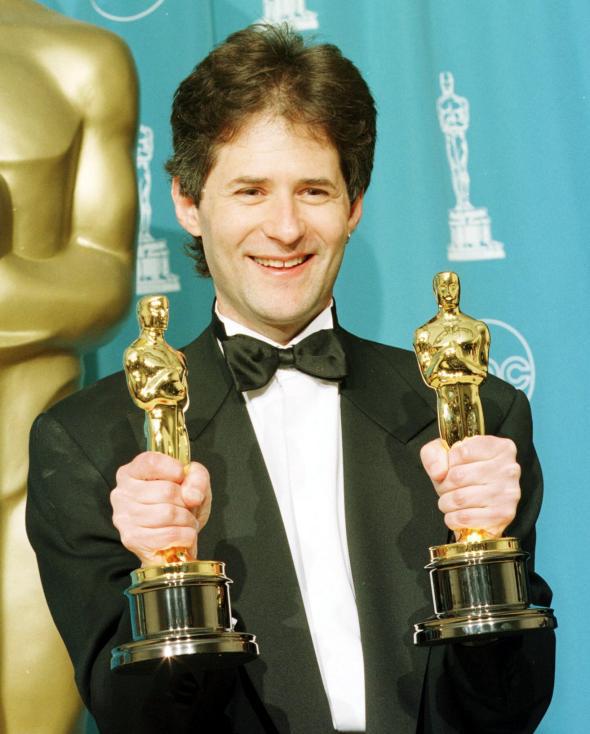James Horner, the prolific film composer perhaps best known for his work on the scores for Braveheart, Titanic, and Avatar, has been confirmed dead at age 61 after a plane crash on Monday. He was the pilot and sole occupant of the small aircraft when it went down before 9:30 a.m. PT outside of Santa Barbara, California. Horner’s assistant, Sylvia Patrycja, confirmed the avid aviator’s death in a Facebook post: “We have lost an amazing person with a huge heart, and unbelievable talent,” she wrote. “He died doing what he loved.”
In addition to flying, Horner loved big, emotionally blunt music—a sensibility that endeared him to many moviegoers while making his position within the film scoring and larger music community somewhat controversial. The low opinions of certain insiders didn’t stop him from having a successful career, however. Unlike prominent contemporary composers like Hans Zimmer and Danny Elfman who came to soundtracks from pop, Horner began his musical life in the traditional conservatory track, studying with modernist master György Ligeti and completing doctoral work in music at UCLA, where he also taught music theory for a time. His film composing career began in 1979, alongside B-movie director Roger Corman, but his first major project was 1982’s Star Trek II: The Wrath of Khan. A first Oscar nomination, as well as the start of an ongoing relationship with director James Cameron, would come for his work on 1986’s Aliens, and from there, Horner went on to score many notable films of the late 80s, 90s, and early 2000s: An American Tail, Field of Dreams, Honey, I Shrunk the Kids, Patriot Games, The Pelican Brief, Legends of the Fall, Apollo 13, Deep Impact, and A Beautiful Mind, among many others.
While Horner’s relationship to his fans was strong—Titanic remains the best-selling orchestral soundtrack of all time, mostly due to the wild popularity of Horner’s collaboration with Celine Dion on “My Heart Will Go On”—critics often accused him of borrowing too much of his music from classical composers, as well as of frequent repurposing of his own material. New Yorker music critic Alex Ross penned a particularly scathing critique on the occasion of Titanic’s success in 1998, in which he tried to define Horner’s style:
He is a composer who is generous enough to assimilate into his own music the work of less fortunate predecessors. In his score for “Aliens” he sampled the opening of Shostakovich’s Fourteenth Symphony. In his score for “Willow” he helpfully simplified the first theme of Schumann’s “Rhenish” Symphony. In the title theme of “Glory” he took the “Humming Chorus” from Prokofiev’s “Ivan the Terrible” and grafted on Elgar’s “Enigma Variations.” Up to a point, such borrowings are not surprising: Hollywood composers work under cruel deadlines and sometimes take creative shortcuts. But Horner goes beyond the pale; he is a kleptomaniac who recycles not only others’ work but also his own.
The way you read these judgements—which were threaded with a larger disdain for much of Horner’s work for being fairly “middlebrow” in its dependence on sweeping strings and “exotic,” often Celtic-New Age, flourishes for color—depends largely on taste and how you feel about the imperative that artists be original above all else. I acknowledge them here not to cast a shadow on Horner’s memory, but because his oeuvre deserves to be considered on its own terms as well.
From the beginning, Horner seemed to prize emotional impact and audience reach over musical innovation and originality. While he is credited with helping to make the mixing of electronics with orchestral sounds in scores commonplace, the majority of his work has a somewhat studied, even cliché (in that it screams this is movie music!) sound—but often, it’s a sound that works incredibly well. This makes sense, considering that Horner himself was under no illusions that his music was “serious,” at least not as classical critics might deploy the word. “I come out of the classical world,” Horner told CNN in 1998, “and I’ve got to say that for me, writing serious classical music, writing a te deum, a requiem, a mass or something, is just absurd in this day-in-age … no one is going to see it, no one is going to pay for it.” He continued: “Whereas writing for film … you can write some wonderful music and get it heard and get it performed by marvelous musicians in a way you could never get in a million years writing a serious piece.”
Horner’s honesty here is refreshing, and it helps us understand his work through a different frame of reference—one that values efficacy over artistic brilliance. And there’s no doubt that the man was effective. Indeed, scrolling through Horner’s discography, especially in the ’90s and early aughts, is like flipping through a cinematic album of my childhood—so much of that music defined what I thought movies were supposed to sound like. I’m sure I’m not the only millennial that’ll have “Whatever You Imagine” from The Pagemaster stuck in my head for life, and the main themes from Braveheart and Jumanji are still kicking around in there as well. Listening to them now with my trained ears, they’ve lost some of their musical luster, but that shiver of childlike excitement still comes through—clearly, Horner achieved his goal.
While most fans will remember Horner for Titanic or perhaps Avatar, my favorite cue of his—a melancholy one that seems fitting to recall today—is from his score for A Beautiful Mind. The music in “Of One Heart, Of One Mind” is Horner at his best, full of emotion and melodically pure, and yet more restrained and elegant than in some of his more “epic” work. Sweet, but not overly sentimental. Sad, but not mawkish. It’s a serious piece of work from a composer who, critical debates aside, had a serious impact on his art form—and more importantly to him, on the moviegoers who experienced it.
